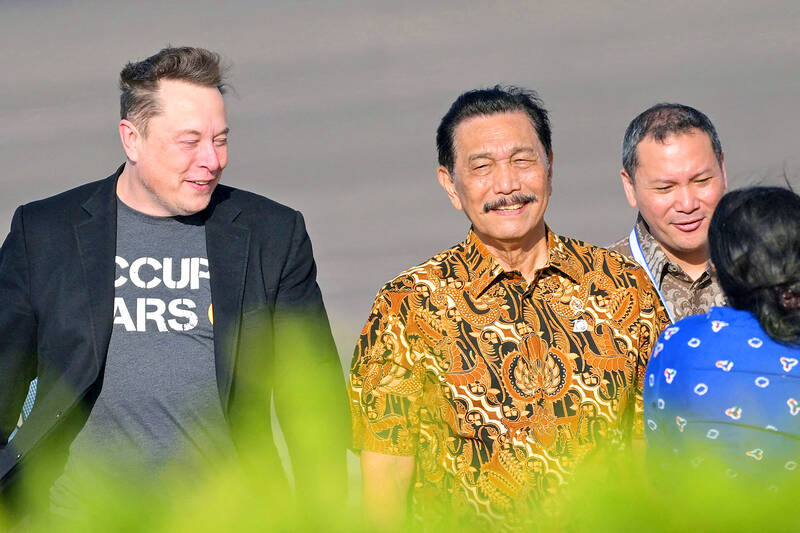Tycoon Elon Musk arrived in Bali, Indonesia, yesterday ahead of the planned launch of Space Exploration Technologies Corp’s (SpaceX) Starlink Internet service, which the Indonesian government hopes would boost Internet penetration and health services in remote parts of the sprawling archipelago.
Indonesian Coordinating Minister of Maritime and Investments Affairs Luhut Binsar Pandjaitan yesterday greeted Musk upon his arrival by private jet at Bali’s airport, Pandjaitan’s Instagram page showed.
The two would discuss several important collaborations, including the inauguration of Starlink, he wrote.

Photo by Sonny Tumbelaka, AFP
Equal Internet access across Southeast Asia’s largest economy, home to more than 270 million people living in three time zones, would enable people in remote areas to enjoy the same fast Internet as those in urban areas, Pandjaitan said.
Musk, the billionaire head of SpaceX and Tesla Inc, was to launch Starlink with Indonesian President Joko Widodo at a community health center in Denpasar, the capital of Bali, yesterday afternoon, he said.
The satellite unit of Musk’s SpaceX has already secured a permit to operate in Southeast Asia’s largest economy, Indonesian Minister of Communication and Informatics Budi Arie Setiadi said last week.
Starlink obtained a permit to operate as an Internet service provider for retail consumers and had been given the go-ahead to provide networks, having received a very small aperture terminal permit, Setiadi said.
GLOBAL PRESENCE
Indonesia is the third country in Southeast Asia where Starlink would operate.
Malaysia issued the firm a license to provide Internet services last year and a Philippine-based firm signed a deal with SpaceX in 2022.
Starlink is also used extensively in Ukraine, where it is employed by the military, hospitals, businesses and aid organizations.
SILICON VALLEY
Separately, Argentine President Javier Milei is planning to meet with Meta Platforms Inc CEO Mark Zuckerberg and other leaders of tech giants in Silicon Valley at the end of this month, people with direct knowledge of the matter said.
The presidential mission to San Francisco would include meetings with representatives of Apple Inc, OpenAI Inc and Alphabet Inc’s Google, among other companies in the technology industry, the people said.
Argentine Ambassador to the US Gerardo Werthein would also be participating in the mission, they said.
The trip comes after Silicon Valley investor Peter Thiel met with Milei in Buenos Aires earlier this month.
Milei has also had two meetings with Musk, including at the Milken Institute’s conference in Los Angeles recently.
The libertarian has won international praise from the likes of billionaire Stanley Druckenmiller for his austerity campaign.
The council of the Argentine president’s economic advisers, led by economist Demian Reidel, is coordinating the final details to push and define the agenda, which would seek investments to turn Argentina into an artificial intelligence hub.
Additional reporting by Bloomberg

MULTIFACETED: A task force has analyzed possible scenarios and created responses to assist domestic industries in dealing with US tariffs, the economics minister said The Executive Yuan is tomorrow to announce countermeasures to US President Donald Trump’s planned reciprocal tariffs, although the details of the plan would not be made public until Monday next week, Minister of Economic Affairs J.W. Kuo (郭智輝) said yesterday. The Cabinet established an economic and trade task force in November last year to deal with US trade and tariff related issues, Kuo told reporters outside the legislature in Taipei. The task force has been analyzing and evaluating all kinds of scenarios to identify suitable responses and determine how best to assist domestic industries in managing the effects of Trump’s tariffs, he

TIGHT-LIPPED: UMC said it had no merger plans at the moment, after Nikkei Asia reported that the firm and GlobalFoundries were considering restarting merger talks United Microelectronics Corp (UMC, 聯電), the world’s No. 4 contract chipmaker, yesterday launched a new US$5 billion 12-inch chip factory in Singapore as part of its latest effort to diversify its manufacturing footprint amid growing geopolitical risks. The new factory, adjacent to UMC’s existing Singapore fab in the Pasir Res Wafer Fab Park, is scheduled to enter volume production next year, utilizing mature 22-nanometer and 28-nanometer process technologies, UMC said in a statement. The company plans to invest US$5 billion during the first phase of the new fab, which would have an installed capacity of 30,000 12-inch wafers per month, it said. The

Taiwan’s official purchasing managers’ index (PMI) last month rose 0.2 percentage points to 54.2, in a second consecutive month of expansion, thanks to front-loading demand intended to avoid potential US tariff hikes, the Chung-Hua Institution for Economic Research (CIER, 中華經濟研究院) said yesterday. While short-term demand appeared robust, uncertainties rose due to US President Donald Trump’s unpredictable trade policy, CIER president Lien Hsien-ming (連賢明) told a news conference in Taipei. Taiwan’s economy this year would be characterized by high-level fluctuations and the volatility would be wilder than most expect, Lien said Demand for electronics, particularly semiconductors, continues to benefit from US technology giants’ effort

‘SWASTICAR’: Tesla CEO Elon Musk’s close association with Donald Trump has prompted opponents to brand him a ‘Nazi’ and resulted in a dramatic drop in sales Demonstrators descended on Tesla Inc dealerships across the US, and in Europe and Canada on Saturday to protest company chief Elon Musk, who has amassed extraordinary power as a top adviser to US President Donald Trump. Waving signs with messages such as “Musk is stealing our money” and “Reclaim our country,” the protests largely took place peacefully following fiery episodes of vandalism on Tesla vehicles, dealerships and other facilities in recent weeks that US officials have denounced as terrorism. Hundreds rallied on Saturday outside the Tesla dealership in Manhattan. Some blasted Musk, the world’s richest man, while others demanded the shuttering of his